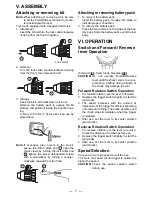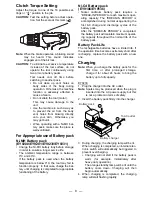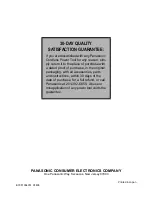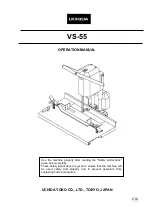
—
2
—
I. GENERAL SAFETY
RULES FOR ALL
BATTERY OPERATED
TOOLS
SAVE THESE INSTRUCTIONS
Work Area
1)
Keep your work area clean and well
lit.
Cluttered benches and dark areas invite
accidents.
2)
Do not operate power tools in explo-
sive atmospheres, such as in the
presence of flammable liquids,
gases, or dust.
Power tools create sparks which may
ignite the dust or fumes.
3)
Keep bystanders, children, and visi-
tors away while operating a power
tool.
Distractions can cause you to lose con-
trol. Make sure that no one is beneath,
or on the other side of the area when
you are working.
Electrical Safety
4)
A battery operated tool with integral
batteries or a separate battery pack
must be recharged only with the
specified charger for the battery.
A charger that may be suitable for one
type of battery may create a risk of fire
when used with another battery.
5)
Use battery operated tool only with
specifically designated battery pack.
Use of any other batteries may create a
risk of fire.
Personal Safety
6)
Stay alert, watch what you are doing,
and use common sense when operat-
ing a power tool. Do not use tool
while tired or under the influence of
drugs, alcohol, or medication.
A moment of inattention while operating
power tools may result in serious per-
sonal injury.
7)
Dress properly. Do not wear loose
clothing or jewelry. Contain long hair.
Keep your hair, clothing, and gloves
away from moving parts.
Loose clothes, jewelry, or long hair can
be caught in moving parts.
8)
Avoid accidental starting. Be sure
switch is in the locked or off position
before inserting battery pack.
Carrying tools with your finger on the
switch or inserting the battery pack into
a tool with the switch on invites acci-
dents.
9)
Remove adjusting keys or wrenches
before turning the tool on.
A wrench or a key that is left attached to
a rotating part of the tool may result in
personal injury.
10)
Do not overreach. Keep proper foot-
ing and balance at all times.
Proper footing and balance enable bet-
ter control of the tool in unexpected situ-
ations.
11)
Use safety equipment. Always wear
eye protection.
Dust mask, non-skid safety shoes, hard
hat, or hearing protection must be used
for appropriate conditions.
Tool use and care
12)
Use clamps or other practical way to
secure and support the workpiece to
a stable platform.
Holding the work by hand or against
your body is unstable and may lead to
loss of control.
13)
Do not force tool. Use the correct tool
for your application.
The correct tool will do the job better
and safer at the rate for which it is
designed.
14)
Do not use tool if switch does not
turn it on or off.
WARNING!
READ AND UNDERSTAND ALL INSTRUCTIONS.
• Failure to follow all instructions listed
below, may result in electric shock, fire
and/or serious personal injury.






























